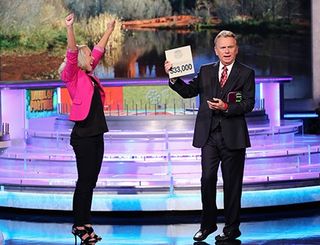Trying to Restore the THRONE of GAMES

The host, with a sly grin on his face, stares across at the celebrity contestant. The two are locked in a battle of wits in a game that’s simple, satisfying and ready-made for humor. Each person—separated by a large black panel with a small opening—must pick one of nine boxes, show the TV and studio audience its contents and describe it to the other person…who must guess if the description is a lie or the truth. The first one to get to two points wins. Everybody in the audience eats it up. Sounds like a fine idea for a daily game show entry.
It is not; it’s a segment called “Box of Lies” that frequently airs on The Tonight Show Starring Jimmy Fallon, whose host must have spent many formative years viewing the likes of Match Game, The Price Is Right and even The Gong Show. This particular segment—won by guest Vince Vaughn, who accurately described a bowl filled with crayons surrounding a large Incredible Hulk action doll (Fallon said he was lying) aired Feb. 18 and already has 1.3 million YouTube views. However, the Box of Lies champ, at least in terms of views, was the one featuring Fallon beating Jennifer Lawrence; more than 21 million have watched it on YouTube.
That scenario may sum up more than anything the continued evolution of the game show, one of TV’s longest-running, most popular genres. On the one hand, several classic landmark series are in the midst of decades-long runs—with the leaders of the five families being Family Feud, Jeopardy!, Let’s Make a Deal, The Price Is Right and Wheel of Fortune. But of late, the glory days of game, which seemed to hit their peak in the 1970s and ’80s, have given way, splintering madly across platforms and myriad viewing categories, seen in YouTube snippets or limited-run series. All of them are trying desperately to break through the mobile era’s Candy Crush clutter, a long way from the singular spotlight that fell on the earliest quiz shows in the medium’s black-and-white coming of age.
The big shows that persevere are nothing short of towering television pillars—Feud and Jeopardy! are pushing 7.0 household ratings, and all five are successes in the 25-54 demo. And yet, in the 15 or so years since the premieres of both Survivor and American Idol, the television staple known as the traditional game show has essentially been hiding in plain sight. True, three series have, in that time, broken into the national consciousness: Who Wants to Be a Millionaire, Deal Or No Deal and Are You Smarter Than a Fifth Grader? But the increasing popularity of competition reality fare has stolen much of the form’s former appeal, much the way a Wheel of Fortune contestant steals a chance to solve the puzzle after someone else does all the lettering guesswork.
“Some reality shows are game-ish. Maybe those are the game shows for this age,” says Harry Friedman, who has been the executive producer for both Jeopardy! and Wheel of Fortune since 1999. “A few years ago there was this great proliferation of talent shows, and nobody saw that coming. Idol is all about engagement and participation.”
Going All-In
This is not to say attempts haven’t been made. The Million Second Quiz lasted only about that long in 2013, after much fanfare. In the same way, 500 Questions was treated as event television (with seven episodes last year), but did better, and now a second season is due. Most notably, the syndicated Celebrity Name Game, hosted by Craig Ferguson and distributed by Debmar-Mercury, is renewed through 2017. Hollywood Game Night, airing on NBC and hosted by Jane Lynch, is holding its own. And Celebrity Family Feud looks to be a good bet as a summer staple.
Broadcasting & Cable Newsletter
The smarter way to stay on top of broadcasting and cable industry. Sign up below
The newer and classic entries succeed by following the tried-and-true formulas of “engagement and participation” that Friedman stresses are necessary for any game show to work, regardless of the era—although it’s certainly more important at a time when keeping young viewer attention is paramount.
“You have to have the play-along factor,” says Ira Bernstein, copresident of Debmar-Mercury. “Family Feud comes on, and immediately you see that we’ve asked 100 people in a shopping mall to give something like the funniest name for a car. Every person watching thinks of the answer. You’re not solving a hard puzzle. And it’s fun.”
“These shows have staying power because it’s family entertainment and always has been,” adds Jennifer Mullin, co-CEO of FremantleMedia North America, who oversees all non-scripted activities including the production of The Price Is Right, Family Feud, Let’s Make A Deal and Celebrity Name Game.
“They’re like comfort food—everyone can watch.”
But Mullin points out that easy family fare goes only so far. “You then have to package it properly with a host and the right contestants,” she says. “It sounds simplistic, but you need that beginning, middle and end. And really, the simpler the better. Any of the enduring games on the air are very simple at their core.”
All About Steve
They also benefit from talent that frequently reaches iconic cultural status—a fate enjoyed most pointedly by Steve Harvey, who took over as Feud host in 2010. Last June, on the strength of Harvey’s hilariously dumbfounded reactions to bad answers, the show topped Wheel of Fortune as TV’s most popular game. And in the best instance of a game show win-win, many of those moments have also gone viral, with several topping 10 million YouTube views.
“That’s the show’s X-factor—you just love Steve Harvey,” says Bernstein. “You want to spend 30 minutes with him. You can’t teach that or plan that.”
The “if it ain’t broke” philosophy continues to power the traditional game show, with a greater nod to cross-platform methods of promotion and distribution. Game Show Network enjoyed its most successful year in 2015 in terms of overall and demo ratings, powered by a heaping helping of classics augmented by limited-run originals, from Skin Wars to Hellevator to Idiotest. The network also has a digital games division that is “very successful and popular,” according to Amy Introcaso-Davis, GSN executive VP programming and development. It’s no idle claim: Through apps and acquisitions, GSN Games is a big player in the global social casino industry.
Fremantle’s Buzzr digital net and TV subchannel, which debuted last June, also generously taps the library of classic entries and satisfies any “Blank!” generation viewer with a hankering to revisit the comedic oeuvre of Charles Nelson Reilly on Match Game. And Comedy Central has taken a satisfying crack at combining the lure of all formats with @midnight, fronted by Talking Dead host Chris Hardwick.
All of which keeps game shows healthier than some other genres with roots that go back to the early days of TV (which hasn’t seen a Western in the 10 years since HBO’s Deadwood, for instance). But the question of whether the form can return to some golden age currently enjoyed by original dramas hangs in the air for the requisite five before a buzzer sounds. Granted, the spirit of the classics infuses the likes of The Voice, Dancing With the Stars and Amazing Race, to say nothing of a slew of made-for-viral game-ettes that Fallon engineers on Tonight. But it seems that game, more than most genres, requires the kind of audience-building patience often in short supply. Hollywood Game Night is performing well enough on NBC, and Celebrity Name Game at a 1.3 household rating is holding steady. Time will have to tell.
“‘Golden Age’ is a pretty high bar,” admits Bernstein. “But I think the pendulum will swing back.”
Mullin believes the genre is close. “There’s a lot of interest in game right now,” she says. “We could just be in a very upward trend.”
Meanwhile, Introcaso-Davis likes its chances. As with any game, the genre requires lots of smarts, strategy and time.
“It’s always about coming up with product people want to see, and about filling a need,” she says. “Look, three years ago, late-night TV was evidently dying and guess what? We will look back on this time as the golden era of late-night television. It’s all cyclical, but really, it’s about knowing the appetite of the audience—and then coming up with something great.”
Rob has written for Broadcasting+Cable since 2006, starting with his work on the magazine’s award-winning 75th-anniversary issue. He was born a few blocks away from Yankee Stadium … so of course he’s published three books on NASCAR, most notably, Full Throttle: The Life and Fast Times of NASCAR Legend Curtis Turner. He’s currently the special projects editor at TV Guide Magazine. His writing has appeared in The Washington Post and his origami art has been in The Wall Street Journal. He lives with his family in New Jersey and is writing a novel about the Wild West.

